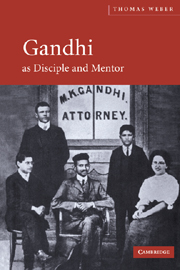Book contents
- Frontmatter
- Contents
- Notes
- Preface
- Glossary
- PART I INFLUENCE
- PART II GANDHI INFLUENCED
- PART III GANDHI'S INFLUENCE
- 8 The influential Gandhi
- 9 Arne Næss – the ecological movement finds depth
- 10 Johan Galtung – peace research moves beyond war
- 11 E. F. Schumacher – economics as if people mattered
- 12 Gene Sharp – nonviolence becomes a political method
- 13 The bottom of the hourglass: Gandhi's influence
- Bibliography
- Index
11 - E. F. Schumacher – economics as if people mattered
Published online by Cambridge University Press: 22 September 2009
- Frontmatter
- Contents
- Notes
- Preface
- Glossary
- PART I INFLUENCE
- PART II GANDHI INFLUENCED
- PART III GANDHI'S INFLUENCE
- 8 The influential Gandhi
- 9 Arne Næss – the ecological movement finds depth
- 10 Johan Galtung – peace research moves beyond war
- 11 E. F. Schumacher – economics as if people mattered
- 12 Gene Sharp – nonviolence becomes a political method
- 13 The bottom of the hourglass: Gandhi's influence
- Bibliography
- Index
Summary
INTRODUCTION
Early in its history, economics was referred to as the ‘dismal science’ because it was seen as being devoid of any moral underpinning and because it seemed to be about untold riches for some and abject poverty for others. Modern economists, of course, do not see it this way. They tend to see the market as being a value-neutral mechanism that is quite good at arranging for a wide and relatively equitable distribution of wealth. Some critics, however, point out that now that technology has enabled the production of countless goods for human consumption, it has not only made possible unlimited consumption and greed but also legitimised it. As demand grows, the problem of unfulfilled needs (at least in the affluent world) becomes one of unfulfilled wants. Economic theory, the critics argue, ignores ‘social wastefulness as distinguished from market wastefulness’. It neglects questions concerning the right to employment, the state as an institution of violence or the corporate system as an institution of exploitation. They claim that the maximisation of consumption and the continual raising of ‘living standards’ became the measures of success. The critics further assert that the expansion of production that led to this also leads to environmental problems, and that so-called efficiency leads to unemployment, exploitation and international inequalities. This expansion is not only aimed at satisfying wants but also to creating ever new (material, not spiritual) ones.
- Type
- Chapter
- Information
- Gandhi as Disciple and Mentor , pp. 218 - 231Publisher: Cambridge University PressPrint publication year: 2004

